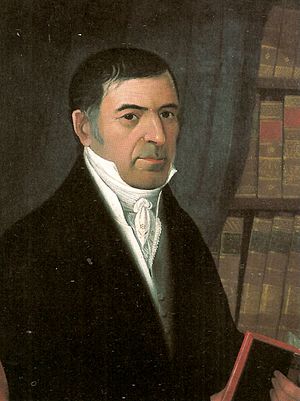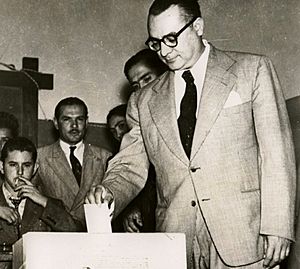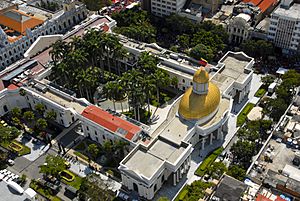Elections in Venezuela facts for kids
Elections in Venezuela are how people in Venezuela choose their leaders. These elections happen at a national level for the President of Venezuela, who is both the head of state and head of government. They also elect members for the National Assembly, which is like a parliament.
The President is chosen for a six-year term. People vote directly for the president, and the person with the most votes wins. A president can be re-elected many times. The National Assembly has 277 members, called diputados. They are elected for five-year terms. Elections also take place in the different states and local areas.
Since 1998, voting in Venezuela has been done using special touch-screen machines. These machines also print a paper record of each vote. The National Electoral Council manages all elections. To vote, you must be 18 years old. In 2011, about 95% of people who could vote were officially registered.
Venezuela used to be known as a stable liberal democracy in Latin America, especially after 1958. However, after Hugo Chávez became president in 1998, the country's democratic system changed. Over time, the government gained more control, and the rights of citizens and opposition groups became less protected. Elections were seen as less fair. Under Chávez and later Nicolás Maduro, the president's power grew, and other parts of the government, like the courts and media, became less independent.
Politics in Venezuela are very divided. Supporters of President Nicolás Maduro belong to the United Socialist Party of Venezuela (PSUV). Many other parties form the opposition. Sometimes, opposition parties or candidates have not been allowed to run in elections. Other times, opposition parties have chosen not to participate in national elections because they felt the elections were not fair. In 2023, Venezuela was ranked as one of the least democratic countries for elections in Latin America.
Contents
History of Elections in Venezuela
Early Elections: 1811–1889
The story of elections in Venezuela began a long time ago. In 1810, a local council in Caracas decided to form a special group to govern. This group, called the Supreme Junta, asked for a congress of all Venezuelan provinces to meet.

In March 1811, during the fight for independence from Spain, the first Venezuelan congress was formed. It decided that three men would share the top leadership role, taking turns each week. Cristóbal Mendoza was one of these three and became the first to serve as president on March 5, 1811. He also helped write the Venezuelan Declaration of Independence, which was officially issued on July 5, 1811. The first Constitution of Venezuela was created in December 1811. It set up a system where the congress had a lot of power, and the executive (the three leaders) had less.
Later, in 1813, Simon Bolivar became the main leader, and the idea of a single president returned in 1830 when José Antonio Páez became president. Since 1811, most leaders of Venezuela have been called "President of Venezuela."
First Democratic Votes: 1900–1989
A period called El Trienio Adeco (1945-1948) saw the first truly democratic elections in Venezuela. This was after a group called Democratic Action came to power. The first elections for a special assembly to write a new constitution were held on October 27, 1946. Democratic Action won most of the seats. A lot of people voted, with 86.6% turnout.
The general elections on December 14, 1947, are often called the first honest elections in Venezuela. Democratic Action won most seats in both parts of the parliament.
However, in November 1948, the elected president, Rómulo Gallegos, was overthrown. Democracy did not return until 1958, when a dictator named Marcos Pérez Jiménez was removed from power.
In December 1957, there was a vote about whether President Marcos Pérez Jiménez should stay in power without new elections. This vote was not democratic. He was overthrown the next year.
The general elections on December 7, 1958, had a very high voter turnout. Democratic Action won the presidency and most seats in parliament again.
New Rules and Changes: 1990–1999
The 1998 presidential election was the first to use a new National Electoral Council. Instead of political parties providing poll workers, a lottery chose 300,000 registered voters to help. This election also used the world's first automated voting system. This system could send results quickly, allowing the Electoral Council to announce winners within hours.
One of Hugo Chávez's promises when he ran for president in 1998 was to hold a vote asking people if they wanted a new assembly to rewrite the constitution. After he won, his first action as president was to order this vote, which happened on April 19, 1999. People were asked two questions: should a new assembly be formed, and should it follow the president's ideas?
Under the new 1999 Constitution, Venezuela's parliament, now called the National Assembly, has only one chamber. It has 165 members, called deputies. They are elected by direct vote. Three seats are set aside for representatives of Venezuela's native peoples. All deputies serve five-year terms. The 1999 Constitution also set a limit of two six-year terms for the President.
Recent Elections: 2000–Present
In 2007, Hugo Chávez's main party, the Fifth Republic Movement, changed and became the United Socialist Party of Venezuela (PSUV). In August 2007, Chávez suggested changing 33 articles of Venezuela's Constitution. He said these changes were needed to make Venezuela a socialist country. However, the proposal was narrowly defeated by voters. In 2009, another vote changed the Constitution again, removing the limit on how many times a president could be re-elected.
The 2010 parliamentary elections elected 165 deputies to the National Assembly. Opposition parties, which had not participated in the 2005 election, joined together as the Coalition for Democratic Unity (MUD) for this election.
In December 2012, regional elections were held to choose state governors and lawmakers. The PSUV won governorships in 20 of the 23 states.
Venezuela's local elections were delayed in 2013 because President Hugo Chávez died. A new presidential election was held quickly, and Nicolás Maduro won by a small number of votes. He became president in April 2013. The local elections for mayors and local council members finally happened in December 2013.
The parliamentary elections in 2015 were a big change. The ruling PSUV lost control of the National Assembly for the first time since 1999. The Democratic Unity Roundtable (MUD), which is an opposition group, won most of the seats.
After these elections, the outgoing National Assembly created a "National Communal Parliament." President Maduro said this was to give "All power to the Communal parliament." This was seen by some as an attempt to reduce the power of the new opposition-controlled National Assembly. In 2016, there was an effort to hold a vote to remove Maduro from office, but the government stopped it in October 2017.
In 2017, Venezuela faced a difficult time when the Supreme Court tried to take power from the National Assembly. This led to many protests. President Maduro then called for a new assembly to rewrite the constitution. The 2017 Venezuelan Constituent Assembly election took place, and only candidates who supported Maduro were elected to this new assembly. This assembly then took power from the National Assembly again.
How Voting Works
Registering to Vote
According to Venezuela's 1999 Constitution, all Venezuelans aged 18 and older have the right to vote. Also, people from other countries who have lived in Venezuela for more than 10 years and are over 18 can vote in regional and local elections. Everyone has the right to register to vote for free.
The National Electoral Council says that more people are registered to vote now. In 1998, about 80% of eligible voters were registered, and by 2011, this number grew to 95%. When people register, their fingerprints and ID details are recorded. These are checked when they go to vote.
The Electoral System
In Venezuela, people vote for the President and for members of the National Assembly. The President is elected for a six-year term by direct vote. Since 2009, there is no limit to how many times a president can be re-elected. The National Assembly has 165 members, who are elected for five-year terms.
Political Parties
Party History

Democracy in Venezuela grew during the 1900s. The Democratic Action party, founded in 1941, was very important in the early years. They led the government during Venezuela's first democratic period (1945–1948). After ten years of dictatorship, four Venezuelan presidents from the 1960s to the 1990s came from Democratic Action. During this time, the main parties often worked together, but the Communist Party of Venezuela was usually left out.
By the late 1990s, people had lost trust in the two main parties because of corruption and poverty. The last president from Democratic Action, Carlos Andrés Pérez, was removed from office for corruption in 1993. The other main traditional party, Copei, also had two presidents.
Today's Parties
Trust in the old parties dropped so much that in the 1993 presidential elections, Rafael Caldera won with only about 30% of the vote, representing a new group. By 1998, support for Democratic Action and COPEI had fallen even more. The 1998 election was won by Hugo Chávez, who was seen as an outsider.
Since then, newer parties like A New Era and Justice First have become more important in opposing Chávez. The United Socialist Party of Venezuela (PSUV) was formed in 2007. It brought together smaller parties that supported Chávez's ideas. It is now the main government party. The Democratic Unity Roundtable (MUD), created in 2008, brings together many of the opposition groups. Hugo Chávez, a very important figure in Venezuelan politics since 1998, died in 2013. He was replaced by Nicolás Maduro, who won the 2013 presidential election by a small margin.
How People Vote
Since 1998, elections in Venezuela have become more automated. The National Electoral Council manages them, and poll workers are chosen by a lottery from registered voters. Voting places have many touch-screen voting machines. After a vote is cast, each machine prints a paper ballot. Voters check this paper and then put it into a ballot box. The voting machines are not connected to the internet until the polls close.
When people vote, their fingerprints and ID details are checked against the voter register. Voters sign a book to confirm they have voted, and one of their fingers is marked with special ink.
In March 2018, Smartmatic, a company that provided voting machines for many Venezuelan elections, stopped working in Venezuela. They said they could no longer be sure the election results from their machines were valid.
Checking the Votes
After voting ends at a polling place, these steps happen:
- The voting machine is told to close the voting session.
- The counting process is announced.
- Each voting machine prints a tally sheet showing the total votes for each candidate from that machine.
- Each machine connects to a network and sends its results to a central counting place.
- More copies of the tally sheet are printed and given to staff and representatives of the candidates.
- The total votes on the tally sheet are compared to the signed voter list.
- For some machines chosen for an audit, the paper ballots are counted by hand to see if they match the electronic totals. Any differences are noted in a report.
Random Paper Ballot Check
After the initial counting, a random check of 54.31% of the machines is done. Staff at each voting center randomly pick machines to audit.
Here's how the check works:
- Voting ends.
- The initial vote counting finishes.
- A random paper ballot audit is announced.
- Machines are chosen randomly by drawing numbers.
- The machine's serial number is recorded.
- The paper ballot box for that machine is opened.
- The paper ballots for each candidate are counted openly.
- The paper count is compared to the electronic tally sheet.
- Any difference, even if it's just one vote, is written in the audit report.
- The original audit report is signed by staff and observers, sealed, and given to the military to deliver to the National Electoral Council.
- Copies are given to the representatives of the top two candidates.
Parliamentary Elections
How Parliament Members are Elected
For the parliamentary elections in 2000 and 2005, a system was used where 60% of the members were elected from specific voting areas, and the rest were chosen from party lists based on how many votes the party got overall.
For the 2010 election, a new law changed things. It reduced the number of members chosen from party lists to 30%. It also separated the district vote and the party list votes completely. This meant that winning a district seat no longer affected how many seats a party got from the list. The new law also redrew the voting districts in a way that some said favored the PSUV, especially by giving more importance to votes in rural areas over cities.
Presidential Elections
Venezuela holds regular presidential elections. The President is elected for a six-year term by direct vote, and can be re-elected without limits since 2009.
One of the first "honest" presidential elections was held in 1947, where Rómulo Gallegos won with 74.3% of the votes. The next elections in 1958 were won by Rómulo Betancourt. In the 1963 elections, Raúl Leoni won. In 1968, Rafael Caldera won the presidency, but Democratic Action remained the largest party in parliament.
Carlos Andrés Pérez won the presidency in 1973 and again in 1988. In 1978, Luis Herrera Campins won. Jaime Lusinchi won in 1983. In 1993, former president Rafael Caldera won again. Voter turnout in 1993 was the lowest since World War II.
After being in prison for trying to overthrow the government and then being pardoned, Hugo Chávez started the Fifth Republic Movement and was elected president in 1998. He was re-elected in 2000.
In 2004, there was a vote to decide if Chávez should be removed from office, but he was not recalled. Chávez was re-elected in 2006. In 2009, a vote removed the term limits for the president. Chávez was re-elected for a third term in October 2012.
Nicolas Maduro won the 2013 presidential election and was re-elected in 2018.
Regional and Local Elections
Venezuela is made up of states, and each state has a governor. These governors have been elected since 1989. Before that, the president appointed them. Regional and local elections were started after a group called the Commission for the Reform of the State worked on changes in the 1980s.
Latest Elections
Here are the most recent elections held in Venezuela:
- Parliamentary: 2020 Venezuelan parliamentary election
- Regional: 2021 Venezuelan regional elections
- Presidential: 2024 Venezuelan presidential election
- Constituent Assembly: 2017 Venezuelan Constituent Assembly election
See also
- Politics of Venezuela
- Electoral calendar
- List of political parties in Venezuela
 | Bayard Rustin |
 | Jeannette Carter |
 | Jeremiah A. Brown |


